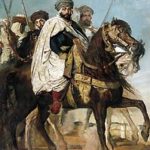
Imagination, by definition, is a fancy of that which does not exist via elements that do exist, in simile or even in straight imitation. The intellectual element in this is one of anticipating something that is expected, something which may or may not happen, or may occur in a different way.
WHOEVER LIVES in snowy areas observes how snow forms in different ways, even while its nature remains one and the same. What it devolves into is water, that is, into what it actually is. So the expectation therefore becomes true, but is nevertheless forced to tie itself to actual phenomena when it passes beyond the limits of snow onto other forms. Now water is active, both in what it does by nature and what results from it: plants, organisms and even parasites when they corrupt – unlike sand. For sand produces nothing other than what is accompanied by water, or unless it itself is a form of soil yielding whatever sprouts as a result of water.
Nature in this environment thus seems to repeat itself as if it were something fixed and extensive and threatens to condemn everyone passing through it to wander, and to wander about in all this extensiveness can only lead to death and loss. Such a state cannot even be termed a ‘natural state’ since it is rather a different, isolated form of nature. Any encounter between people that takes place there is exclusively a matter of traveling in groups and temporary halts.
It obligates being satisfied with whatever went before or plundering what is not provided there. It creates a mirage, which the thirsting person mistakes for water, whereby whenever he approaches it, he discovers it to be false. He thus returns to where he was or makes for somewhere else, dreaming about the thing which he did not find to be real. This spells ‘loss’ in both its symbolic and even physical sense.
It obligates being satisfied with whatever went before or plundering what is not provided there
Now places, as I gather, are defined by human activity, both material and mental. It is not strange to find that civilizations of the sea are similar to, and approximate, civilizations of rivers and valleys. Interaction between these is all the more likely, and the degree to which they accept anything different is high. They are thus governed by a logic of life that promotes investigation and recognition of multiple phenomena in its vital arena. It defines destinations on the basis of water as their life-giving property, despite the dangers that water can cause them. In such an environment no-one wanders about lost in the land; he is guided by seas or rivers even at night – whenever he draws nigh to it, he can sense it in the breeze or even smell it.
But what about this mindset when its bearer changes its geographical location or contributes to transforming it as it moves from the desert to the city?
A civilization of religion
It could be said, following Ibn Khaldun’s perceptions, that urbanization and the emergence of power, presumably a political entity, is a transition from one state to another, one in which a mature mind acts in such a way as to build an intellectual structure through logic and imagination. But history proves that urbanization is itself influenced by a mind’s nature which it has inherited from its basic original environment and, according to the values of a faith, establishes its urbanization and furnishes it in accordance with the prevailing religion. The same goes for the nature of power which was based on the clan, as Ibn Khaldun himself asserted. A rule therefore emerged which, albeit benefitting from the experiences of those that preceded it, in its essence remained clannish and tribal in the way it conceived of governance.
I believe that a civilization of thinking differs and contradicts this civilization of religion, which forms its unity and strength and its civilization upon selectively deriving lessons from the experiences of others, without identifying with them – since it did not make any contribution to its creation and development.

Suggested Reading
The same thing happened with thought itself, in that it remained obsessed with its theology, many elements of which it derived from what was Christian and Jewish, all the while modifying and absorbing its ingredients, as an interpretation of Islam and even of philosophy – except for some rarified elements which it initiated when it became independent of scholastic theology (‘ilm al-kalam) and tried to create horizons beyond its close ties to Greek philosophy, and perhaps other Indian and Persian philosophies in their religious formulations.
And what were the results of all that? Did it succeed in achieving an intellectual, civilizational and political resurgence?
One of the paradoxes of ancient history, in both its demographic and geographical conditions, is that a civilization may possess the ingredients of power via its military force without at the same time possessing a culture more advanced than those it defeats, and so it finds itself in competition with them. It thus has to develop an acquaintance with their sciences and knowledge, and sometimes even learn their language as a necessity not as an option. But when the assailant culture is a religious culture the behaviour towards others differs. This was especially the case when the culture was Islamic, one that was only beginning to shape its religious conception of the world and even the civilization it was seeking to build. In order to preserve what it considered distinctive to itself, it had to obliterate what preceded it or suppress some of it.
In order to preserve what it considered distinctive to itself, it had to obliterate what preceded it
The strongest aspect of this cancellation process is the obliteration of the other’s language and history.
In Egypt the Pharaonic language was considered a forbidden language, since it had been spoken by Pharaoh who had claimed divinity for himself. In the land of Iraq – the land of the Babylonians and Assyrians – and Greater Syria with its Syriac speakers, or Morocco with the Amazigh, this erasure did not succeed. It failed in Iran, Spain and Morocco, where the Amazigh language survived as an oral communication protected by its distant mountain fastnesses and deserts.
As the language of the Revelation, Arabic alone was worthy of existence and its holiness had to be preserved. Yet the turn of history’s course nevertheless preserved those who kept onto their language, and these went on to resume their civilisational trajectory despite maintaining what they considered to be an Islamic heritage – with the exception of Al-Andalus, or present-day Spain.
Stumbling on a belief
Christianity was not equated to a state, with the exception of the third century AD under the influence of the Romans. This was due to the spread of Christian thought, and the apprehension of politicians that its social dominance might transform into a political force. A prejudice against Judaism and their ghettoisation was also considered justified due to their having killed the Messiah. This continued right up to the Middle Ages.
However, scientific discoveries, and the collision of science with a clergy that supported the politicization of Christianity, ended in confrontation. European thought as a result returned to its pre-Christian self, rediscovered Greek thought and rationality, and thus resumed and gave support to its ancient heritage.
Europe thus triumphed scientifically, politically and culturally, whereas the Arab world, when it was minded to shake off the dust of backwardness and progress forward, found only a controversial model of governance, and a philosophical heritage without any support from science, given that it had persecuted people, their thought and their culture as books were burnt or distorted.
The Arabic language became an obstacle to all forms of intellectual contemplation or any creative or philosophical thought
They also found theological elements in tafsir to be mingled with fairy tales and legends held to be sacralised, explanatory texts. And as for the Arabic language, this was fenced around with the sacred scripture, in whose name borderlines were set for it, disrupting any connection with other languages. It thus itself became an obstacle to all forms of intellectual contemplation or any creative or philosophical thought. It was tied to poetry and turned into a servant of a rigid, traditional, repetitive mindset sacralising all forms of stagnation and derivative thought. It became Salafised in both its content and what it aspired to, and despite all the developments in linguistic and semantic sciences, remains barred from engaging in new discoveries or challenging the legacy of the predecessors by any re-reading and examining of them.
The outcome of this trajectory was that the western European mind began to be an opening and challenging mind, one that obliged Christianity to return to its origins, reflect on eschatological salvation and give support to the ethics of brotherhood, to break with aggression and critique its medieval history. Although, it should be said, its texts and teachings were not responsible for the violence carried out in its name, it itself at times fell victim to its followers and religious institutions.

Suggested Reading
The Arab world, on the other hand, and the Islam it brought in tow, found itself in my view shackled by slogans that afflicted woes upon it, slogans such as ‘Islam is a religion and a state’ – a formula supported by its philosopher jurists such as Al-Ghazali who, in his work Al-Munqidh min al-Dalal, said that ‘the regime and the religion are twins: religion is the foundation and the regime is its guardian’.
This is how the Arab mind lived then and lives now, proud of its palaces, supporting the authority of religion or at best re-interpreting it, placing it at the service of the authority that protects it and is secretly protected by it. Those, on the other hand, who seek to elevate the authority of the intellect are viewed with suspicion and threatened, painted as ‘enemies of Islam’, while secularists and Westernisers at best have to label themselves as ‘enlighteners’ to avoid getting into hot water.
